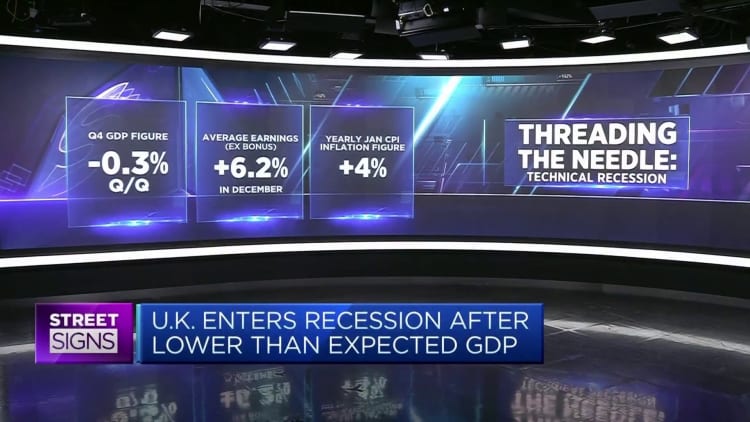British Finance Minister Jeremy Hunt said earlier this month that the UK would not enter a recession this year.
Hannah McKay | Reuters
LONDON – Economists expect British Finance Minister Jeremy Hunt to use a small fiscal windfall to deliver a modest package of tax cuts in the spring budget on Wednesday.
As what will likely be the Conservative government's final financial event before the country's next general election, Hunt is under pressure to offer consolation to voters, with his party trailing the main opposition Labor party by more than 20 points in all national opinion polls.
But it must also overcome constraints imposed by fragile public finances and a stagnant economy that has recently entered a modest technical recession.
On the upside, inflation fell faster than expected and market expectations for interest rates were much lower than before Hunt's autumn statement in November.
The Treasury previously announced plans over the weekend to deliver benefits worth up to 1.8 billion pounds ($2.3 billion) by boosting public sector productivity, including freeing up police time for more frontline work.
The Independent Office for Budget Responsibility estimates that a return to pre-pandemic productivity levels could save the Treasury up to £20 billion a year.
The Treasury said on Monday that Hunt will also announce £360 million in funding to boost research, development and manufacturing projects in the life sciences, automotive and aerospace sectors.
However, big questions about the tax cuts continue to head into Wednesday's statement.
Increase financial leverage
Sanjay Raja, chief economist at Deutsche Bank, said: “Overall, we think Chancellor Hunt's fiscal space is likely to have increased – but only marginally, and nowhere near what it was in the autumn statement (largely due to lower debt costs). expected). in a research note Thursday.
The German lender estimates that the government's fiscal space will grow from around £13bn to around £18.5bn, and that tax cuts are “very likely” to be the first outlet. Raja noted that the Finance Minister would err on the side of caution in easing fiscal policy, preferring to support the supply side rather than boost demand.
“In our view, supply-side measures are more likely, especially as the Bank of England is more willing to ease monetary policy,” Raja said.
“Therefore, tax cuts on National Insurance contributions and changes to child benefit are more likely to come in the Spring Budget (contrary to previous expectations of income tax cuts).”
A big cut to National Insurance was the highlight of Hunt's statement in the autumn, although economists were quick to point out that its benefit to payers would be erased by the impact of the current freeze on personal income tax thresholds – known as the “fiscal drag”. “
National Insurance in the UK is a tax on workers' income and employers' profits to pay government social security benefits, including the state pension.
Raja also suggested that extending the government's current freeze on fuel excise duty was still a possibility, and that some spending cuts would likely be used to partially offset the easing of fiscal policy.
In total, Deutsche Bank expects Hunt to achieve net relief of £15bn over the next financial year, falling to around £12.5bn over the medium term.
“The fiscal outlook remains risky. Small changes in the macroeconomic outlook could lead to major shifts in public finances. The Chancellor continues to walk a fine line between managing his fiscal rules now and increasing austerity later,” Raja said.
“To be sure, big fiscal questions remain – including whether spending cuts, or limited increases in some areas, remain realistic to address growing pressures in public services, and the government’s own ambitions on net zero, defense and overseas. Development spending.
Economists at BNP Paribas expect a more modest package of tax cuts worth around £10bn over the 2024/25 financial year, and expect the government to start the year with a fiscal windfall of around £11bn.


The French bank agreed that the cuts would aim to stimulate labor supply, with “minimal impact on inflation and therefore the Bank of England”.
“Our rule of thumb is that the government will spend the £10 billion windfall in the near term and use the extra fiscal space in the medium term to cut personal taxes,” economists Matthew Swannell and Danny Stoilova said in a research note titled “Last Chance Salon.” “.
They also expect the Treasury to postpone the March 2024 fuel duty rise for a further 12 months, at a cost of £3.7bn a year, and introduce a permanent one-penny cut in the basic rate of income tax at a cost of £3.7bn. 6 billion and 7.35 billion pounds sterling annually.
“The overall effect of this policy package will be to leave the medium-term fiscal headroom roughly where it started at £12.7 billion,” they added.
“With the Tories trailing in the polls, and the Budget perhaps the last chance to ease fiscal policy before the general election, we expect Chancellor Hunt will once again spend, at the very least, any extra fiscal space available to him.”
